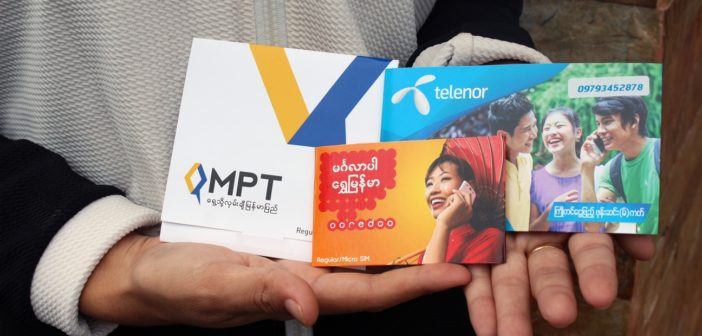SIM card prices in Myanmar remain among the highest in the world despite repeated promises by the government to dramatically lower costs. As yet the public’s expectations have gone largely unfulfilled since the government halved SIM card prices in 2011. That year, they dropped from about US$625 to between $312 and $250.
Simcard-Myanmar-Burma. But such prohibitively high prices are still outside the reach of most: Myanmar has the second-lowest mobile penetration rates in the world, just in front of North Korea.
Although SIM card prices from MPT remain high, progress has been made in opening the market to international telecommunications firms. In January the government announced it was accepting tenders for two telecommunications licenses, which closed on January 25.
They are reportedly the first of four licenses to be leased for up to 20 years, with possible extensions of an as-yet undetermined length of time. However the entry of international firms could be met with resistance from those with vested interests in MPT.
For foreigners, the situation is somewhat different. A plan is already in place to allow foreigners increased access to cheap SIM cards. Currently, they may purchase temporary one-month SIM cards for K18,000 ($21) but from June 2013 the government will make three-month SIM’s available for US$15, in the run-up to the Southeast Asian Games, according to U Htay Win, chief engineer of MPT. The move is part of the government’s plan to increase mobile and fixed phone penetration rates to the ambitious target of 80 percent by 2015.
The main problem besetting wider phone access in Myanmar is chronic underinvestment in the network, which is already frequently jammed. Allowing foreign investment into the country must therefore be a central policy measure to expanding communications access, as Myanmar currently lacks both the capital and the technical knowledge necessary to create a network that can accommodate anywhere near 80pc of the country’s estimated population of 60 million.
A senior official at MPT, Kyaw Soe, was quoted in the Jagran Post in September last year as saying that the government had big plans to deregulate the sector. He said that of the four licenses planned to be granted, two would be reserved for Myanmar companies, one of which would go to a privatised MPT, which would be renamed the Myanmar Telecoms Company (MTC).
There is also work to be done legislatively. A draft telecommunications law currently being reviewed by government administrative departments will need to be enacted to even allow investment in and operation of mobile networks by private companies. The same applies to internet access, which also has comparatively low penetration rates.
The internet too has a raft of problems in Myanmar. While the government has eased restrictions and most websites formerly banned are now accessible, the country still sits behind a nationwide firewall that blocks some news websites periodically, as well as pornography, gambling and interestingly online dating, although social networking websites on the whole are largely permitted.
However the internet too will require vast sums of investment to expand access to the majority of the population. But here, arguably, there is less incentive to stifle progress. As Freedom House journalist Sam DuPont explains: “A cynical — though probably realistic — interpretation of the new moves toward broader, lower-cost access might posit that the Burmese government foresees such a bounty of online and mobile surveillance (as already practiced in countries like China and Iran) that the expected political cost of expanding access has dropped to nil. But for those activists with the skills to ensure a degree of digital security, the falling cost and rising speed of internet access will be a boon to their efforts at protest, organising, and advocacy. In a country so long cut off from the world, the greater opportunity to access information and express opinions is an immense and positive change.”
DuPont makes a good point, though maintenance of the current firewall into the future is not a certainty. Rather it will depend on whether democratic reforms continue, particularly after the 2015 presidential election. Should Myanmar find itself with a reformed and truly democratic government sometime in the future then the usefulness and political feasibility of a firewall will significantly decline.
What is certain is that proponents of expanding internet access face significantly more hurdles than do advocates of increasing mobile communications access. As neither increased internet or mobile phone access will be easy to accomplish, the public will simply have to continue to watch and wait.
==> Read more:



 (218 votes, average: 4.74 out of 5)
(218 votes, average: 4.74 out of 5)

